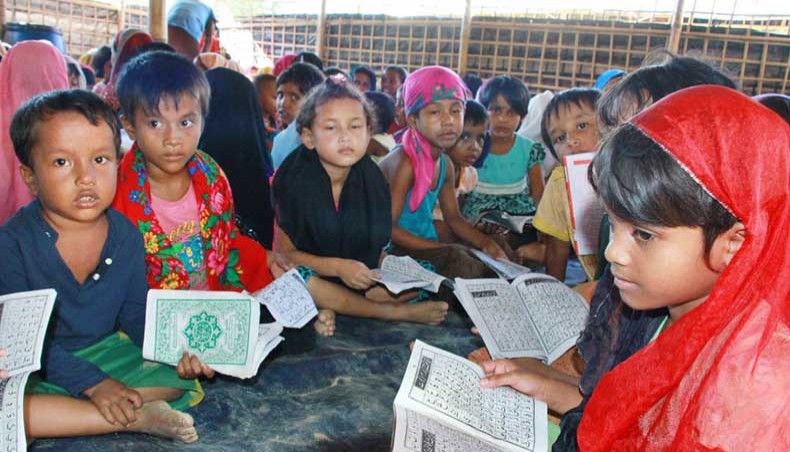Rohingyas facing safe water crisis
Thousands of Rohingyas entering Bangladesh to flee violence in Myanmar are facing shortage of safe drinking water in absence of adequate number of deep and shallow tube wells as well as jerrycans for transport and storage of safe water.
The situation of Rohingyas crossing into the country has aggravated as rains have washed human excreta to ponds and water bodies from where they collect water for drinking and others daily needs as they continue defecating in open spaces.
Transport and storage safe water for refuges are not only important only for drinking but also for doing day to day household chores like cooking.
International aid workers have estimated that about 7,700 shallow tube wells and 470 deep tube wells will be needed for ensuring safe drinking water for over half million Rohingyas. They have also estimated that 1,50,000 jerrycans would be needed for transport and storage of safe water.
Humanitarian agencies have promised that they would supply the jerrycans and install the deep tube wells while the Bangladesh government is supposed to set up 2,200 shallow tube wells.
Of the requirements, 2,600 shallow tube wells and 380 deep tube wells are yet to be installed and 1,17,000 jerrycans are yet to be distributed among the Rohingyas, said officials concerned.
Department of Public Health Engineering assistant engineer in Cox’s Bazar Mohammad Nasar Ullah and Inter Sector Coordination Group’s WASH sector coordinator Abu Naim Md Shafiullah Talukder said that they were working to ensure safe drinking water for Rohingyas.
According to UN estimation on Thursday, 5,36,000 Rohingyas entered Bangladesh in the past seven weeks in the new influx what the United Nations called the world’s fastest-developing refugee emergency.
Officials estimated that the new influx already took to 9.54 lakh the number of Myanmar nationals living in Bangladesh entering the country at times since 1978.
Rohingyas fled violence and persecution in Rakhine state in 1978, 1991-92 and October 2016 and almost all of them took shelter at Teknaf and Ukhia in Cox’s Bazar, which housed two registered and several other unregistered Rohingya camps.
The new influx began after Myanmar security forces responded to Arakan Rohingya Salvation Army’s reported attacks on August 25 by launching violence what the United Nations denounced as ethnic cleansing.
Terrified, half-starved, exhausted Rohingyas continued arriving in Bangladesh in groups trekking through hills and forests and crossing rough sea and the River Naf on boat and taking shelter wherever they could in Cox’s Bazar and Bandarban.
Many Rohingyas took shelter at makeshift camps in reserved forests, felling trees, setting up shanties on hill slopes while some of them took shelter at overcrowded registered and unregistered camps.
These haphazard sprouting of camps have made it hard for aid workers to supply safe drinking water to the Rohingyas.
Till Saturday, 5,100 tube wells were set up, 2,100 by the Department of Public Health Engineering and 3,000 by humanitarian aid agencies, said officials concerned.
They added that humanitarian agencies set up 90 deep tube wells and distributed 33,000 jerrycans among the Rohingyas.
International aid agencies have estimated that additional 5.86 crore litre safe water per day is the minimum requirement for the Rohingyas.
The water crisis is more acute for Rohingyas taking shelter in Unchiprang area as the area has no access to surface water. Areas close to border and the Naf River have no or very limited access to safe water and latrines.
‘Existing water sources are rapidly reducing; if the current population density remains, there may be serious water scarcity by January 2018,’ said a situation report prepared by international aid agencies in the last week of September.
Raohingya Rahmat Miah living in Unchiprang area said, ‘Had we have facilities to store water, it would have reduced our pain to collect water crossing hilly path.’
Another Rohingya Khaleq said that places where tube wells were installed were always crowded with people collecting water. ‘Old and children are worst suffers as they cannot wait for so much time,’ he added.
World Health Organisation, UNICEF, International Federation of Red Cross and Red Crescent Societies, International Organisation for Migration, Médecins Sans Frontières, also known as Doctors Without Border, and other international agencies in separate statements in September in the past one month warned of an outbreak of diseases and stressed the need for supply of safe water and sanitation facilities to the Rohingyas.
Wild elephants trampled four Rohingyas, three children and a woman, to death early Saturday as they were residing at makeshift camp at Balukhali of Cox’s Bazar, said Ukhia police station officer-in-charge (investigation) Mohammad Kai Kislu.
They were trampled to death by seven or eight wild elephants, he said.
Earlier on September 18, two Rohingyas, an elderly person and a child, were killed by elephants as they were sleeping in a makeshift shelter at Ukhia, a safe passage for elephants for centuries.
News Courtesy: www.newagebd.net











